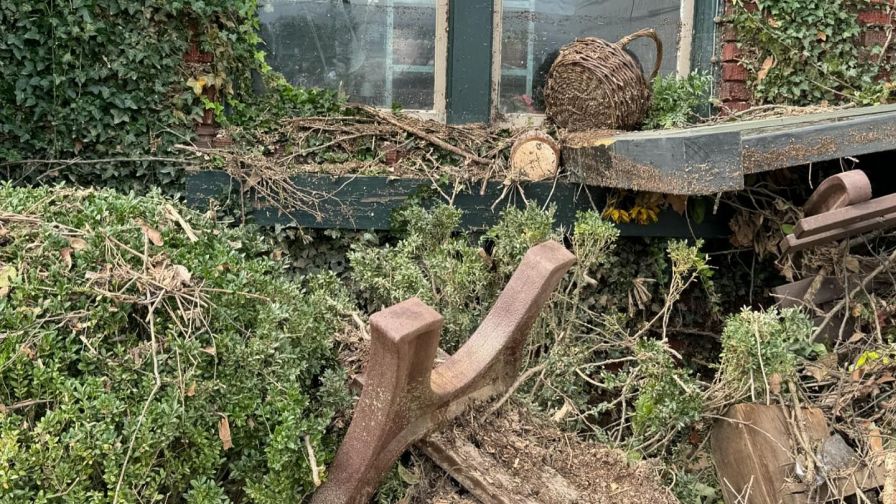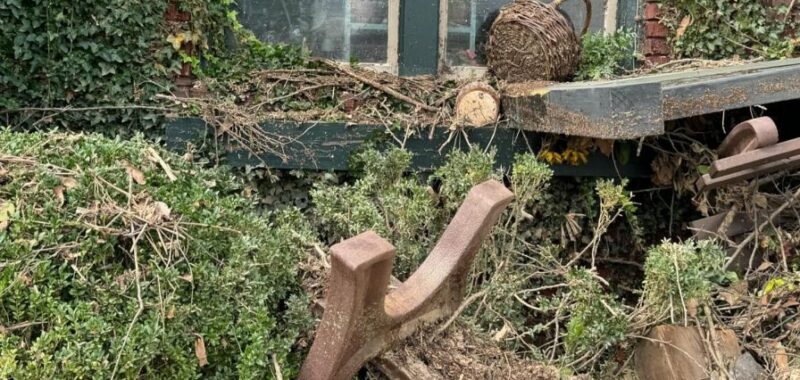
Damage from Hurricane Helene | Gardener’s Cottage
Last week, we here at Greenhouse Grower took a look at the impact Hurricane Helene had at large on the inhabitants of Southeast states and the agricultural and horticultural sectors. Today, we’d like to narrow our focus more to some of the specific greenhouses, nurseries, and other horticulture businesses affected by the storm and their current and ongoing recovery efforts to bounce back from the calamity.
Bedford Greenhouses – Augusta, GA
On Saturday, Sept. 28, Bedford Greenhouses released a short statement on its closure:
“Bedford Greenhouses is closed until further notice due to hurricane damage and loss of water and power.”
With recovery updates posted to its community Facebook page, the company announced an intent to reopen on Sunday, Oct. 6.
“We’re thrilled to announce that we will reopen on Monday, October 7th, and continue our regular hours on Tuesday, October 8th! Thank you to everyone who checked in on us, volunteered, and worked tirelessly to help Bedford get back up and running. Your support made all the difference during this challenging time.”
Carolina Native Nursery – Burnsville, NC
Carolina Native Nursery had 90% of its on-hand inventory wiped out due to floodwaters. Additionally, the businesses experienced significant infrastructure damage as a result of the storm.
“We estimate 90% of our plants are on their way to the Atlantic Ocean at this time,” says Bill Jones, President of Carolina Native Nursery.
Current recovery efforts are ongoing. The nursery has an open GoFundMe that has already exceeded its goal of $50,000 and is sharing updates regarding operation rebuilding and repairs on its Facebook page.
Gardener’s Cottage – Asheville, NC
On Monday, Sept. 30, Gardner’s Cottage posted an update to its Facebook page.
“I was finally able to see the shop yesterday and although the damage is considerable, we are just grateful to be safe and above all else thinking of our neighbors and community. We will get through this together one day at a time. Thank you for your care and concern for our little shop and I’ll update more as I know more.”
At the time of writing, the business has not released any further updates regarding its recovery process.
Metrolina Greenhouses – Huntersville, NC, and York, SC
Metrolina Greenhouses, a wholesale greenhouse producer with locations in the Carolinas, put out a statement on Saturday, Oct. 5, regarding Hurricane Helene’s destruction.
“While our facilities in York, SC and Huntersville, NC were unharmed, our priority has been ensuring the safety and well-being of our team members, particularly those based in Western North Carolina and South Carolina, where the impact has been greatest.”
“Our Metrolina Community Outreach team has begun organizing donations to key groups in the local community, and we are also supporting donated goods to local drop-off points, including the Lake Norman YMCA in Cornelius, NC, and Liberty Church in York, SC, which are collecting supply donations.”
“At Metrolina, we stand with those affected by Hurricane Helene and we are committed to helping our communities rebuild. We are grateful for the generosity of our team and neighbors. More to come as we know this sudden event has created long-term need and commitment from our team, our company, and our family.”
The full statement can be read on the company’s Facebook page.
Raymond’s Garden Center – Hendersonville, NC
Raymond’s Garden Center made an initial statement on Monday, Sept. 30.
“We are all safe and sound but, due to the impact of Hurricane Helene, Raymond’s Garden Center will be closed until further notice.
While still closed, cleanup efforts for the business are underway, with regular updates and resource information shared on its Facebook page.
Sow True Seed – Asheville, NC
On Tuesday, Oct. 1, Sow True Seed, an employee-owned open-pollinated company released a statement on Facebook saying that its staff was safe, and that damage to its location was minimal, but that its shop would be closed for the foreseeable future, with no further updates being made since then.
“Thankfully, our downtown garden shop and warehouse made it out unscathed. Many of our neighbors, neighborhoods, and communities in this region did not. The damage and scale of loss, while still unfolding, is heartbreaking and unimaginable.”
The Greenery of Tampa Bay – Land O’ Lakes, FL
The Greenery preemptively closed on Thursday Sept. 26 out of precaution for Hurricane Helene’s path, releasing the following statement:
“Our offices will be closed Thursday and possibly Friday with Hurricane Helene on the move and threatening our beloved State.”
However, the garden center now seems to be back open and running without issue.
Thyme in the Garden – Asheville, NC
Thyme in the Garden, a family-owned and operated garden and gift shop, released a Facebook statement regarding its closure for the foreseeable future, promising updates on reopening once it learned more.
“Our business, while impacted by flood, will recover. We will remain closed for the foreseeable future while we focus on taking care of basic needs.”
Disaster Recovery and Support Resources
In our previous article, Greenhouse Grower covered some of the steps for businesses to take in the aftermath of Hurricane Helene’s damage to their operations. AmericanHort’s horticulture advocacy team recently put out its own list for those affected by Hurricane Helene, and for the growing threat of Hurricane Milton approaching Florida:
- Contact your local/county USDA Farm Service Agency (FSA) office.
- Contact your state horticultural association or the Department of Agriculture for assistance.
- Photograph and document any damage before starting cleanup efforts.
- Notify local authorities of new developments and obstructions (roadblocks, utility outages, and other hazardous situations).
- Reach out to disaster assistance agencies to inform them of your situation.
- Secure buildings and structures and make necessary repairs to prevent further damage to ensure the safety of those in the area.
Additional resources and assistance options to consult and pursue include:
USDA Disaster Assistance
The USDA provides a range of programs for agriculture producers affected by natural disasters, including crop insurance, disaster recovery support, and emergency loans.
USDA Emergency Conservation Program (ECP)
The ECP provides funding and technical assistance to restore damaged farmland, as well as to navigate emergency water conservation measures during severe droughts.
USDA Tree Assistance Program (TAP)
The Agricultural Act of 2014, as part of the 2014 Farm Bill, authorized the Tree Assistance Program to provide financial assistance to qualifying growers to replant or rehabilitate trees, bushes, vines, and other plants damaged by natural disasters.
USDA Emergency Forest Restoration Program (EFRP)
The EFRP provides funding to privately owned forests to restore forest health due to damage from floods, hurricanes, and other natural disasters.
Federal Emergency Management Agency (FEMA)
FEMA offers disaster assistance to both individuals and businesses, including grants and temporary housing.
U.S. Small Business Administration (SBA)
The SBA provides low-interest loans of all sizes to those affected by declared disasters.
State and Local Resources
State and local agencies provide additional assistance programs more specific to their affected areas. Some examples in the affected areas of Hurricane Helene’s path include:

